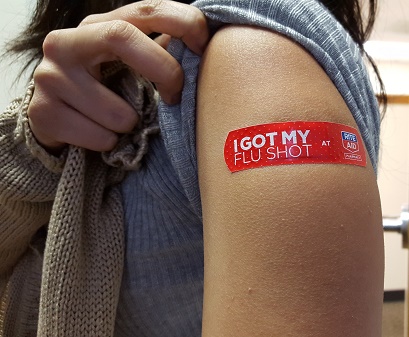It’s almost flu season. You know what that means? It’s officially flu shot season.
A recent survey asked millennials if they planned on getting the flu shot this year. Fifty-two percent said no. This is concerning. The Centers for Disease Control and Prevention (CDC) recommends that everyone over six months of age gets a flu shot every year. So why are young people so wary of the idea?
Half of the respondents who were not planning on getting the flu shot said they didn’t think the shot would prevent them from getting the flu. About a third were worried the shot could actually make them sick. A quarter said they didn’t want to spend the money.
I’ve heard similar doubts expressed by my friends, most of whom are supportive of vaccines in general but skeptical of the flu shot specifically. Unfortunately, these doubts are unfounded myths that seem to spread like, well, the flu.
Over the last 30 years, between 3,000 and 49,000 people have died of the flu each year. The most vulnerable populations, representing the majority of flu related deaths, are the very old and very young. Last year, 90 percent of children who died of the flu had not received the vaccine.
The best way to reduce the number of deaths is the flu shot. While getting his own flu shot during a press conference, Dr. Tom Friedman — director of the CDC — reiterated this point, saying, “If we could increase vaccination coverage in this country by just five percent more, that would prevent about 800,000 illnesses and nearly 10,000 hospitalizations. Flu vaccine is one of the best buys in public health.”
A wealth of studies have shown you are less likely to get the flu after getting the flu shot. But more importantly, you will also be less likely to pass the flu onto the old and young people around you. Additionally, even if you do still get the flu, your symptoms will be reduced if you received the shot.
To clear up the next flu shot myth: the flu shot cannot give you the flu. While some side effects are possible — a sore arm and possibly a low grade fever — the flu vaccine is made with inactivated (i.e. killed) viruses, meaning it is not infectious.
Finally, the Center for Student Wellness at the U is offering free flu shots throughout the fall, so there is no need to let money be a barrier either. Students can get the flu shot for free on Thurs., Oct. 27 at 5-7 p.m. in Heritage Center 1B, and on Thurs, Nov. 10 at 11 a.m.-2 p.m. in MLIB Gould Auditorium. If none of these times are convenient, most Smith’s and Walgreen’s offer flu shots at very affordable prices. You can find locations offering the flu shot nearest you here.
So, despite what you have heard, and even if you have never gotten it before, go get the flu shot. The vaccine takes about two weeks to achieve full effectiveness, and given the unpredictable schedule of flu epidemics, the CDC recommends getting it by the end of October. Don’t put it off!


